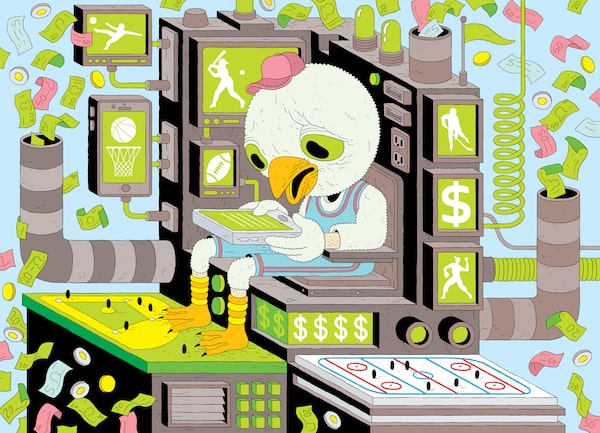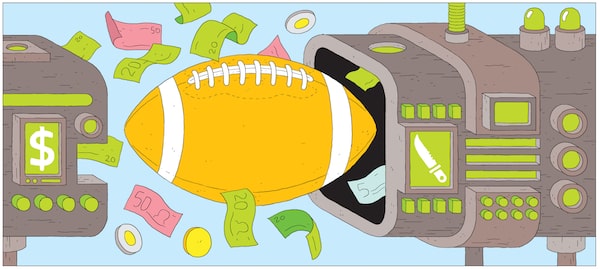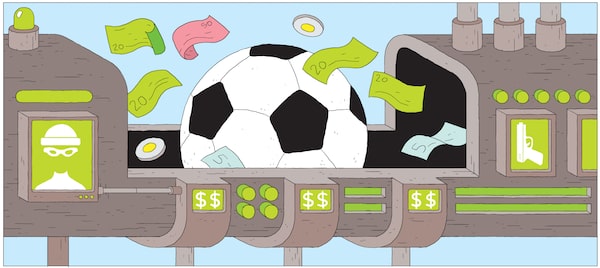
Illustrations by Jesse Jacobs
Declan Hill is an associate professor of investigations at the University of New Haven and the lead of its Sports Integrity Center. He is the author of The Fix: Soccer and Organized Crime and The Insider’s Guide to Match-Fixing.
It’s a brave new world.
When sports fans switch on their TVs, check an app or go to a game, they are now swimming in a sea of ads for online gambling sites. Toronto Raptors fans tuning into the pregame show might see a betting segment during the broadcast. The Blue Jays have partnered with TheScore Bet to open a branded restaurant at Rogers Centre and bring in stadium branding and in-game features. The NHL has partnerships with betting companies, and stars Connor McDavid and Auston Matthews are official “brand ambassadors” for web-based bookmakers.
During the fog of COVID, many pieces of legislation drifted through Parliament and provincial legislatures with little oversight.
One example was Bill C-218, the federal legislation that legalized single-event sports gambling. Before then, the only sports gambling allowed was a parlay bet or a series of bets on different games.
On April 4, the sports betting gates were swung open to private bookmakers in Ontario. Other provinces have a range of regulation but all, essentially, have legalized sports gambling. Most of them operate primarily online, as that’s where the majority of betting takes place these days.
Much of the Canadian media have fully accepted this changing reality. Betting will allegedly bring new tax revenue, create new jobs, and is a family-fun activity. To watch the Super Bowl is to see a series of ads featuring high-profile Hollywood celebrities touting the benefits of gambling.
Many Canadian media outlets either have business relations or are “official partners” with bookmakers. It’s an odd phenomenon. Few people would think that media institutions should be officially linked to addictive tobacco or alcohol companies, yet in this honeymoon period many companies have thrown themselves into the arms of bookmakers.
It is worth examining what happened in other countries, such as Britain, the United States and much of the European Union, which passed similar legislation in recent decades.
If their experiences are repeated here, there will be a range of serious problems that few people in Canada are speaking about.

Illegal gambling won’t disappear – in fact, it could grow
It wasn’t supposed to be like this.
After the body of Harry Lainas was found in a parking lot on Toronto’s Danforth Avenue, his killing was quickly connected with a series of shootings and murders related to the control of Canada’s illegal sports gambling market. Mr. Lainas was the victim of a targeted mob-style hit in an area where he was allegedly known as a “collector” of unpaid money from bets.
The question that should trouble Canadians is why he was murdered in February, 2021, just as Canadian politicians were gearing up to legalize sports gambling.
One of the main reasons for this legislation was to drive the criminals out of bookmaking, so why would any mobster bother killing someone? All these “grey-market” bookmakers were supposed to be eliminated with the legalization of gambling.
Yet just as the decriminalization of marijuana has not gotten rid of the illegal drug market, many police believe the expansion of legal gambling will merely feed the criminal gambling world.
According to former FBI undercover agent Joe Pistone (aka Donnie Brasco), it is difficult to overstate gambling’s importance to organized crime. In an interview, he claimed that gambling is far bigger than narcotics for the mob, “because it is everyday. And you also make money on loans to the gamblers and then you get to take their businesses when they get into debt.”
The Rizzutos, the mafia group that corrupted large sections of the Quebec construction sector and government services, also ran an illegal sports gambling ring that police estimate was worth $500-million a year.
When their mob collapsed, the ‘Ndrangheta, who had killed off much of the Rizzuto organization, stepped in and ran the ring.
In the past 10 years, there have been a series of major police investigations into mob-controlled gambling in Ontario. One case showed that the ‘Ndrangheta and members of the Hells Angels had combined to run an illegal sports gambling network in Toronto and North York worth over $100-million.
In the 1990s, Michael Franzese was a capo (captain) in the Colombo crime family in New York. He ran a dozen illegal sports books and he says despite the arguments put forward for legalizing sports gambling, the criminal bookmakers “are not going anywhere.” The No. 1 reason: easy credit.
For the serious gambler, illegal markets still have a number of advantages over their legal counterparts. They charge a lower commission (“vig”) on the bets, there are no taxes and lots of easy credit. The mob wants losing gamblers to borrow as much money as possible at high interest rates – they get more money.
The gambling lobbyists could be right in their argument that a new, liberal approach will discourage the mob. But, according to police officials, Canadian mobsters are not attacking each other because the market is shrinking, but because they think their market is going to grow. As more Canadians gamble, more will be drawn into the criminal networks.
For a sneak preview of how legal and illegal gambling markets feed off each other, it’s worth focusing on a major mob trial currently taking place in Reggio Calabria, Italy. The sports gambling market in Italy, like many European Union countries, was liberalized in the early 2000s. Part of the rationale was to cut down on organized crime.
The trial features hundreds of alleged mobsters from four organized-crime groups: the Sicilian Mafia, the Camorra from Naples, the Sacra Corona Unita from Puglia and – the most frightening of all – the ‘Ndrangheta of Calabria, the same group that took over much of the illegal Canadian sports gambling from the Rizzutos. These powerful organized-crime groups combined, according to Italian prosecutors, to build a sports gambling network that helped fix soccer matches, money-launder and made them enormous amounts of money.
One meeting, covertly taped by police and contained in court documents, caught the spirit of this criminal enterprise. It was between one of the alleged gambling ringleaders, Francesco Martiradonna, and another man who wanted to use violence. Mr. Martiradonna replied, “I am looking for people in the best universities in the world and you are still in the streets looking for dummies to do bam-bam. I am looking for people who can click-click, and move money. It’s all about the index finger.”
Using these “index finger” methods, the Italian organized-crime groups were able to move billions of euros. Their methods, studied by one of my doctoral students, Michele Vittorio, was to essentially shift cash from the legal to illegal sports gambling markets. Prosecutors discovered a trail of bank accounts and dummy companies stretching across the continent and into North America.
In an online version of the 1920s bootleggers whose bars used to be hidden behind legal shopfronts, the mob built legal bookmaking websites, where trusted customers could click on certain parts of the site and open a “trap door” that would take them to illegal sections of the website where the credit was easier, the commission was lower and there was no tax on winning bets.
The danger for North America is that our patchwork of provinces, territories and states – some of which have legalized sports gambling, while others have not – is an open invitation for money laundering, particularly if Canada’s old bogie – match-fixing – arises.

Raising the stakes for match-fixing
There is a rapid growth of match-fixing going on across the sports world. Canada has long had a reputation in the international gambling market as an easy mark for match-fixing. The last time our men’s national soccer team qualified for the FIFA World Cup, prior to this year’s qualification, a faction of players fixed a match in Singapore against North Korea.
In the 2010s, the semi-pro Canadian Soccer League (CSL) was notorious among international bookmakers in having regular fixed matches. One match was so bad that it ended in farce as the honest team decided to punish the fixing team and started to score in their own goal to deny the fix. The fixing team then took the ball and tried to score in their own goal. The last 20 minutes of the match was spent with each team frantically trying to score in their own goal.
One problem that the league had in fighting this type of corruption is that there is no specific law in Canada making match-fixing illegal. The danger is, now that gambling is so common and easy, the challenges of stamping out corruption are going to get worse.
The proponents of legalized sports gambling point out that there is now an entire sports gambling monitoring industry that can detect fixed matches using algorithms. It’s a complicated discussion, for these new companies may be able to figure out when some matches are fixed, but often, as was the case with CSL, it does not stop the fixing. In fact, according to another colleague at the University of New Haven, match-fixing has now expanded into new types of sports in Canada.
“We have just had [match-fixing] in FPS [first-person shooter] e-sports and it has involved a lot of Canadian players,” says Richard Lewis, an investigative journalist and adjunct professor who spent two decades uncovering corruption in the new billion-dollar e-sports marketplace. In one case, his work helped catalyze an FBI investigation into e-sports match-fixing in America.
He recently passed documents to e-sports authorities about match-fixers in Canada. Mr. Lewis says, “They [the fixers] felt empowered to operate with impunity because they have identified the jurisdictional loopholes that essentially mean they haven’t even broken any laws by Canadian standards.” Another issue Mr. Lewis identifies is that , unlike the U.S. or Australia, there is no dedicated police unit in Canada to help prevent match corruption, let alone a law specifically banning it.

A casino in your pocket
Jack Ritchie died because of sports gambling. Actually, he died, according to a British coroner, because of the government’s inability to properly regulate the gambling industry.
In 2007, Britain, under the former Labour government of Tony Blair, liberalized its sports gambling market. It is a good warning for Canada. Because now, according to their Gambling Commission – the government regulator – tens of thousands of British teenagers are problem gamblers.
Jack Ritchie was one of them. At 17, he wandered into a betting shop on a school lunch break. He won £1,000 and became hooked. Seven years later, overwhelmed by gambling issues, he died by suicide.
His mother, Liz Ritchie, is unsparing in her views of the industry. “This is a form of child abuse. It is happening to … thousands of other young people. [They] are being given a life-threatening illness and then told it’s their fault.”
Ms. Ritchie, a retired psychotherapist, and her husband Charles, a former head of research in government, established a group of families who have had similar tragedies. The Gambling with Lives website features a page of photos of young people who have killed themselves because of gambling. On another page, a dossier of academic research papers estimates that more than one person a day kills themselves because of gambling in Britain.
The Ritchies claim that the new form of online “frictionless” gambling is driving this issue. In the past, gamblers would have to go to a physical location, such as a race course, to place their bets. Now, with mobile phones, they are walking around with the equivalent of a casino in their pocket. Add in the scale of gambling advertisements and the promises of “free bets” that bookmakers offer, and there are rising problems.
In 2013, when gambling researcher Darragh McGee returned to Britain after five years, he was struck by what he describes as the “gamblification” of sport resulting from the 2007 changes in legislation.
“Everything had changed radically in just a few years,” says Prof. McGee, now an assistant professor of health at the University of Bath. “Gambling had become a normalized part of sports fandom and leisure consumption. And that was such a shock because I had left a Toronto, Canada, that was free from all of that kind of commercial trapping.”
What Prof. McGee saw was a sports world that had moved headlong into an embrace of gambling. Most top-level English soccer teams are sponsored by betting companies. As in Canada, there are strong links between sports media and gambling, where prominent players and journalists are linked to bookmaking sites. This focused the coverage away from pure sports to tracking odds. Thus many younger fans regard sports simply as a vehicle for gambling. They are encouraged, in part, because bookmakers now run “live betting” with dozens of possible bets in a single game.
Prof. McGee is currently writing a book on the astronomical growth of sports gambling globally. While endorsing the legalization of sports gambling, he is concerned about the lack of informed debate. In his academic research, he tracked a group of young men – the demographic who are most at risk from sports gambling.
His research found that some of his subjects had cycles of debt, strained family relationships and mental-health issues. In particular, the young men had a distorted relationship with money and did not recognize the risks of online gambling. One told him, “I’m in debt to my eyeballs from payday loans. I’m blacklisted with them all. I’m in about £15,000 of debt … all for gambling. It took over my life for a while. When my daughter was born, I used to sit on the computer continuously gambling for the day.”
A March, 2022, online survey by the charity GambleAware estimated that there were 1.4 million problem gamblers in Britain. The gambling industry hit back, claiming that these numbers were overstated and that the real number is actually around 170,000 people. These divergent numbers are a reflection of two wider debates: one, how to do accurate polling when few people answer their phone, and, two, how much of the British academic research on betting is sponsored by the gambling industry? However, what everyone agrees on is that the number of people receiving therapy for their gambling issues is a fraction of the real number of addicts.

When addicts are your best customers
Legalized betting is often sold as a game of skill: the savvy bettor against the wily bookmaker. Chris Rasmussen, an adjunct faculty member and investigator at the University of New Haven, was previously a top bookmaker for Danske Spil, a European sports book with about one million customers. The number of those who beat the book over the course of one year? According to Mr. Rasmussen, just five. Yet when addicts get into debt, the debate is often framed as if it is their fault for not being intelligent enough to win or stop gambling.
The problem, according to another research paper presented to the U.K. House of Lords by GambleAware, is that the essential business model of some bookmakers is dependent on a small group of heavy gamblers. Their research showed that in online sports gambling, 86 per cent of the profits came from just 5 per cent of their customers.
I found a similar phenomenon on a research trip to the global headquarters of offshore gambling in Manila, in the Philippines. One bookmaker there told me that the average gambler is a loss for some of their companies – the real money for them is to be made by identifying the heavy losers, the types of people who would gamble away their baby’s diaper money.
Sky Bet, an industry giant, was found by the British newspaper the Daily Mail to have tracked self-declared problem gamblers and then used their information to target them often when they were most vulnerable.
Next month, the British government is expected to deliver a report advocating reform of the gambling market based on, in part, the research done by the U.K. charities. This follows March’s judicial inquest that determined the British government had played a role in Jack Ritchie’s suicide. The coroner specifically singled out the lack of regulation, education and treatment for gambling problems as “woefully inadequate.”
The Ritchies were happy at the legal triumph but still angry at the lack of debate in their country. In December of 2021, Charles Ritchie declared, “It’s unacceptable that hundreds of mostly young people are dying every year and there are no investigations, and nothing is being learned.”
This is not to say that single-event sports gambling should again be made illegal in Canada. Nor is it to say that every bettor will end up in debt, connected to the mob or with mental-health issues. Yet the Canadian gambling market badly needs a few simple pieces of government regulation.
Canada needs to beef up its jail sentences for mob-connected bookies. It needs an amendment to the Criminal Code specifically making match-fixing illegal. It should follow Britain’s example and prohibit gambling ads from appearing where children can see them. There should be a decoupling of official partnerships between bookmakers, sports teams, players, leagues and media companies. Finally, education and health professionals need to be educated in the dangers of gambling addictions.
Without these steps, Canadians should prepare for an increase in addiction, gambling-related suicides and more gang-land deaths.
Keep your Opinions sharp and informed. Get the Opinion newsletter. Sign up today.